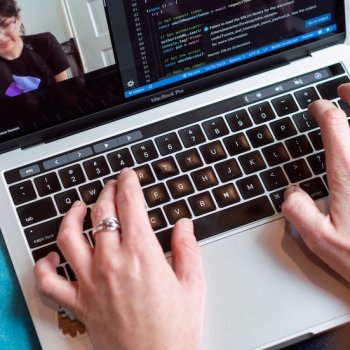Since starting en masse in March 2020, remote work has been viewed upon favorably by most employees.
One of our studies even found workers were willing to slash their pay or PTO in exchange for remote work.
But remote work anxiety or FOMO (fear of missing out) has become an unforeseen side effect of remote work, especially as some companies implement hybrid models where some employees are in the office and some remain home.
The latter have lost the everyday conversations and chemistry-building moments that help foster a healthy working environment.
Worse still, they're home alone staring at a screen and stewing with their thoughts.
Are co-workers in the office talking about my performance? Do they think I'm slacking off because I'm home? Am I being passed over and left out of conversations?
For all of its positives (and there are many), remote work is also fertile grounds for feelings of anxiety and paranoia.
People have always had a fear of missing out since they are social creatures. Even in the office, the keen observer can ask what is going on over there and why I am not involved. This may be normal anxiety, but it is being worsened by your inability to see or hear what is going on in the larger organization or even in your own team because you can only see or hear what is going on through the laptop-sized window.Tanner Arnold, President & CEO of Revelation Machinery
To gain some insights into remote work anxiety, Breeze conducted a survey of 1,000 employees who have been working remotely since the start of the pandemic and continue to work remotely even though their company now has some people back in the office.
We found remote work anxiety is widespread, and it's leading to decreased productivity, physical ailments, and emotional lows.
Many employees are dealing with remote work anxiety
Out of 5,314 adult American respondents, 1,000 were qualified to complete our survey, which meant they have been working remotely since the start of the pandemic and continue to work remotely, even though their company now has some people back in the office. If you'd like to see the raw data or data broken down by state, gender, race, age, etc., please email me at [email protected]
Of those 1,000 qualified respondents, the plurality (47%) indicated they have been dealing with remote work anxiety as other employees have started returning to work. Another 17% preferred not to answer or were unsure of their feelings.
Claire Grayson of Personality Max can relate:
I’ve been working remotely since the beginning of the pandemic. Now that some of my colleagues are returning to the office I’m trying to evaluate my place in the company.I’m definitely experiencing remote work anxiety and more specifically social anxiety. It’s getting harder to talk during meetings since I’m on my own the whole day. When I have to present I get anxious which is something I never had before.I noticed that I’m always the last one to find out about last-minute changes in the organization. We’re rapidly growing as a company so there are a lot of adjustments being made. Somehow, I feel like I miss those things.
We then followed up with the 47% that have reported remote work anxiety by asking this question:
Had you been feeling remote work anxiety and/or FOMO when all employees were still working remotely and no one was in the office?
66% answered "yes," while 27% answered "no," and 7% answered "not sure/I'd rather not say."
For over a quarter of applicable respondents, remote work anxiety is something new that only started when some coworkers started returning to the office.
It's a significant percentage and shows remote work anxiety will likely grow as a problem as we move away from entirely remote workplaces and more towards hybrid models.
Remote work anxiety is crippling productivity & employee health
Our survey found a large percentage of employees are dealing with remote work anxiety.
What does it mean?
A blow to productivity for starters...
A combined 66% said remote work anxiety and/or FOMO has hurt their productivity or efficiency at work, while a combined 28% said it has not.
But remote work anxiety is having more concerning impacts than just decreased productivity. Our survey revealed employee health, both physical and mental, is suffering as a result of remote work anxiety.
Let's start with physical impacts...
55% of respondents said remote work anxiety has led to "exhaustion, lethargy, or trouble sleeping," while 49% have dealt with "aches and pains or muscle tension," and 44% have experienced "headaches or dizziness."
The mental impacts were just as significant...
More than half of respondents indicated depression as a result of remote anxiety and/or FOMO, while 49% have dealt with irritability.
Claire Grayson can attest firsthand to the negative impacts of remote work anxiety:
My remote work anxiety has had a negative impact on my mental health. As much as I love my job, I’m sometimes doubting if I’m the best person for it. I’ve noticed that my self-confidence is going down and it’s getting harder and harder to perform.This is also affecting my career. The more time I spend at home the less motivated I am to develop professionally. A couple of years ago I had a clear vision of how I wanted my career to develop. Now I’m just focused on my weekly tasks and I don’t really think about the future.
These results are alarming and need to be promptly addressed especially as remote work and hybrid models become the norm. Proper counseling and professional help would be useful parts of any solution.
On that, 57% of applicable poll participants noted they have sought out professional and/or medical help as a result of remote work anxiety, while 33% have not, and 10% opted not to say.
For those that have sought professional help, 67% said their employer health insurance plan or other benefits program is helping with the costs. While not common, an employee mental health program that covers therapy sessions is one of the best employee benefits and can help greatly in instances like this.
Why is remote work anxiety happening?
Our survey has showed how prevalent remote work anxiety has become, in addition to its negative impacts.
But why is it happening?
Poll participants most commonly cited doing too much work because they are worried their remote work lifestyle might be interpreted as slacking off. This is sometimes referred to as "imposter syndrome."
Dan Skaggs of One Thing Marketing is all too familiar with this:
There is a certain anxiety I have felt since transitioning to working from home. I often feel guilty for not being in the office with my co-workers. If they can go back to work, why can’t I? Am I a less dedicated worker? This Imposter Syndrome has resulted in me doubting my every work-related move.Are my superiors seeing me as less hard working because I am not coming into the office? I have often noticed a preferential treatment towards those working in the office as I am often being passed up for projects due to not physically being present.
Edward Mellett, the founder of WikiJob, has also seen remote work turn into overworked:
Due to the blurring of the lines between home and work during the pandemic, many people report having more difficulty "turning off" their work. As a result, this always-on mentality contributes to emotional and physical tiredness and may even contribute to extended burnout.
A lot of remote work anxiety seemed to stem from just generally not being in the office. For example, 20% said they think in-office coworkers are being preferred just because they are in the office. 17% said they are not part of the everyday conversations or team bonding moments. 11% were worried about in-office colleagues talking behind their backs.
"Out of sight, out of mind" was a recurring phrase.
Melissa Collins of Perfect Brew used it:
One cause for remote work anxiety could be the widespread “out of sight, out of mind” attitude toward remote workers, which creates a lack of trust, a sense of detachment, and a tendency for people to believe their colleagues are gossiping about them behind their backs.
As did Tina Rhodes of Think Save Retire:
I am someone who went remote at the beginning of the pandemic, and have not yet returned to the office although other coworkers have.It has been difficult to adapt because discussions and decisions are happening without my presence or knowledge. I definitely feel that my ability to influence decisions is diminished, and at times it has felt like my career trajectory may have taken a dip since I am out of sight and out of mind for some of my superiors.
Why don't they just return to the office?
Most offices have reopened, and a lot of people have returned to work. If you're suffering from remote work anxiety why don't you just head back to the office?
It's a reasonable question, so we asked it to applicable respondents.
As it turns out, the plurality of respondents (43%) indicated they actually plan on returning to the office because of remote work anxiety.
Claire Grayson plans on heading back:
I’m considering going back to the office. Yes, the benefits of the home office are many, but I feel like I’ve spent too much time at home and this is starting to effect me in a negative way. I need to reconnect with my co-workers and create a better work-life balance.
As does Carolina Dorsey:
Remote work anxiety is definitely damaging to my career path, and I can hardly focus on the work as I've been constantly thinking about the major changes that aren't discussed virtually. I constantly feel like I'm out of the loop. The anxiety that goes along with it is tremendous.This issue became so major that I have decided to go back to the office in October.
However, a lot of remote workers simply can't go back to the office for one reason or the other.
For example, 12% would have to physically move where they live as remote work has enabled many employees to live far away from company headquarters. Another 23% are still concerned about the pandemic, which has yet to be soundly defeated. 15% have too many other responsibilities, whether it be kids or pets, and remote work has become the only possible option.
As much of the working world moves forward with a hybrid model, it will be interesting to watch how it plays out. It is clear that employers will need to place on emphasis on keeping remote workers engaged, informed, and heard.
Can disability insurance protect your income if remote work anxiety keeps you from working?
Disability insurance is a type of insurance coverage that will replace a portion of your monthly income if injury or illness prevents you from working.
There is short term disability insurance, which is intended to cover some of your income after a temporary injury or illness that will keep you from working for several weeks, like a broken hand. Then there is long term disability insurance, which is meant for more severe injuries or illnesses, like cancer.
In terms of how much disability insurance will cost, the average cost is usually between 1 percent and 4 percent of your annual income. There is disability insurance for individuals and group disability insurance and the amount you pay will also depend on this. Group plans will usually come from your employer if enough employees are interested in disability insurance.
So if you're suffering from remote work anxiety and unable to work as a result, could disability insurance ensure at least some of your income is protected?
It's entirely possible, but will really depend on various factors.
Whether or not you are able to get disability insurance for mental health reasons will depend on when you took out a policy, when you started feeling remote work anxiety, who your insurer is, the level of work you are still able to complete, amongst other things.
Get a personalized disability quote in seconds.
Methodology
All data found within this report derives from a survey created and commissioned by Breeze and conducted online by survey platform Pollfish. In total, 1,000 adult Americans were surveyed. To qualify for the survey, each respondent had to have been currently working remotely full-time with the same company since the beginning of the pandemic and continuing to work remotely with that company, even though other co-workers have returned to the office. The appropriate respondents were found via Pollfish’s age filtering feature, in addition to a screener question. Out of a possible 5,314 respondents, 1,000 met the specific age and employment criteria. This survey was conducted over a three-day span, starting on September 23rd, 2021, and ending on September 25th, 2021. All respondents were asked to answer all questions truthfully and to the best of their abilities.
Survey results
Notes: Some answers won't add up to exactly 100% due to rounding.
If you'd like to see the raw data or data broken down by state, gender, race, age, etc., please email me at [email protected]
1. (ALL) Since other employees have returned to the office, have you started feeling "remote work anxiety" or "remote work FOMO (fear of missing out)?"
- 47% answered "yes"
- 36% answered "no"
- 17% answered "not sure/I'd rather not say."
2. (Asked only to those who answered "yes" to Q1) Had you been feeling remote work anxiety and/or FOMO when all employees were still working remotely and no one was in the office?
- 66% answered "yes"
- 27% answered "no"
- 7% answered "not sure/I'd rather not say."
3. (Asked only to those who answered "yes" to Q1) Has your productivity and/or efficiency as an employee been negatively impacted by this remote work anxiety and/or FOMO?
- 30% answered "Yes, very much so."
- 36% answered "yes"
- 20% answered "no"
- 8% answered "No, not at all."
- 6% answered "not sure/I'd rather not say."
4. (Asked only to those who answered "yes" to Q1) As a result of remote work anxiety and/or FOMO have you dealt with any of the following physical symptoms? (SELECT ALL THAT APPLY)
- 49% answered "aches and pains or muscle tension"
- 41% answered "chest pain, heart racing, or shaking"
- 54% answered "exhaustion, lethargy, or trouble sleeping"
- 44% answered "headaches or dizziness"
- 31% answered "high blood pressure"
- 33% answered "stomach aches, digestive problems, or loss of appetitie"
- 26% answered "weak immune system"
- 8% answered "other"
- 7% answered "no"
5. (Asked only to those who answered "yes" to Q1) As a result of remote work anxiety and/or FOMO have you dealt with any of the following mental/emotional symptoms? (SELECT ALL THAT APPLY)
- 49% answered "irritability"
- 52% answered "depression"
- 46% answered "panic attacks"
- 47% answered "sadness"
- 9% answered "other"
- 10% answered "no"
6. (Asked only to those who answered "yes" to Q1) As a result of remote work anxiety and/or FOMO, have you sought out professional and/or medical help?
- 57% answered "yes"
- 33% answered "no"
- 10% answered "I'd rather not say."
7. (Asked only to those who answered "yes" to Q1 & Q6) Is your employer covering or helping with the costs of this professional and/or medical help?
- 67% answered "Yes, through our employer health insurance plan and/or other benefits."
- 16% answered "Yes, but not as part of an insurance plan and/or other benefit."
- 8% answered "No, because it's not part of our employer health insurance plan and/or other benefits."
- 4% answered "No, but that's because I haven't told them about it."
- 3% answered "other/I'd rather not say."
8. (Asked only to those who answered "yes" to Q1) What best describes why you believe you are suffering from remote work anxiety and/or FOMO?
- 41% answered "I'm working too hard/too many hours because I'm worried my employer might think I'm slacking off as a remote worker."
- 17% answered "I'm not part of the everyday conversations or company bonding moments/events."
- 11% answered "I'm worried other coworkers might be talking behind my back and/or negatively talking about me."
- 19% answered "I believe other coworkers in the office are being preferred over me and/or will take promotions over me since they are in the office and I'm not (i.e. getting passed over, hurting my career growth)."
- 10% answered "I don't have the in-person presence to showcase my talents and/or good work."
- 3% answered "other"
9. (Asked only to those who answered "yes" to Q1) Since you are suffering from remote work anxiety and/or FOMO, why don’t you return to the office?
- 43% answered "I actually plan on returning to the office because of this."
- 12% answered "I would physically have to move where I live."
- 15% answered "I have too many responsibilities outside of work (kids, school, pets, cooking, etc.)."
- 23% answered "I'm still very concerned about the COVID-19 pandemic, especially the new variants. I don't want to catch it or spread it."
- 7% answered "other"
10. (Asked only to those who answered "yes" to Q1 & anything but "I actually plan on returning to the office because of this." to Q9) If you don’t plan on returning to the office, do you think this continued remote work anxiety and/or FOMO will eventually lead to you quitting, getting fired, or leaving for a new job?
- 38% answered "yes"
- 34% answered "no"
- 28% answered "not sure/I'd rather not say."
11. (ALL) Since you started working remotely full-time, have you received a raise and/or promotion?
- 48% answered "yes"
- 38% answered "no"
- 14% answered "I'd rather not say."
12. (Asked only to those who answered "no" to Q11) Do you believe you have not received a raise and/or promotion because you have been working remotely full-time?
- 33% answered "yes"
- 49% answered "no"
- 19% answered "not sure/I'd rather not say."
13. (Asked only to those who answered "no" to Q11 & "yes" to Q12) If you continue to work remotely full-time at this job, do you believe you will ever get a raise and/or promotion at this job?
- 34% answered "yes"
- 46% answered "no"
- 20% answered "not sure/I'd rather not say."










